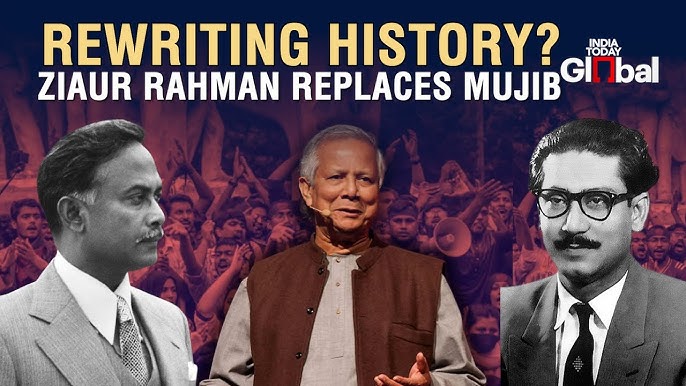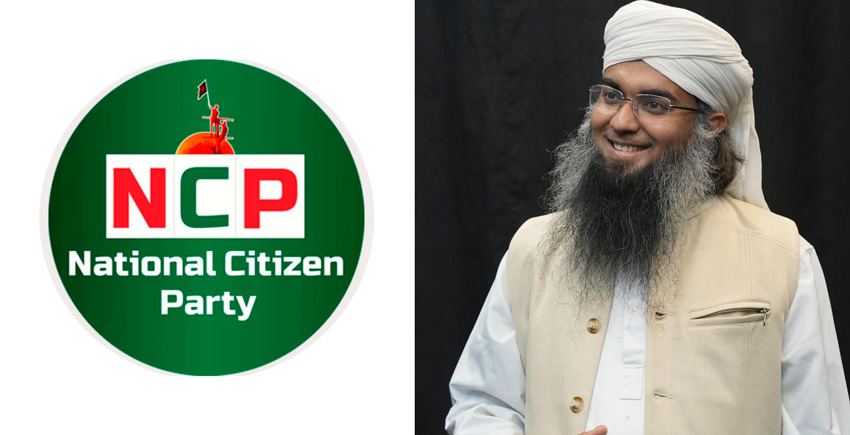There have been various scandals and blunders over free textbooks, including allegations of corruption, low-quality prints, and delays in distribution, this year due to a new nexus of dishonest officials, pro-government politicians, student leaders, and businessmen.
Officials say although there is a specific standard for the brightness of books in the NCTB tender, many printing houses did not follow it. Low-quality gum has been used in binding these books.
There have also been irregularities in the covers and page numbers of textbooks.
At least 33% of low-quality books filled with such irregularities and inconsistencies have been given to primary and secondary-level students. Hence, out of 400 million books, 130 million are of poor quality.
Last year, the government printed about 310 million textbooks. However, due to curriculum changes, 400 million books were printed for 2025.
Removing Bangabandhu
The revision of the books also drew significant attention, as the Jamaat-controlled interim government—led by Awami League critic Muhammad Yunus—removed prose and poetry by Hindu and progressive writers, altered the description of the Liberation War, and downplayed the role of Father of the Nation Bangabandhu Sheikh Mujibur Rahman, among other controversial acts.

After the August 5 coup, changes were made to the textbooks for grades 11 and 12. The article, Bayannor Dingulu, from Bangabandhu’s book The Unfinished Memoirs and Sheikh Kamal’s biography have been removed.
Similarly, Prof Dr Muhammad Zafar Iqbal’s Mohajagotik Curator, Dilwar’s Manush Sokol Satya, and Mahadev Saha’s Shantir Gaan have also been removed. On the other hand, the Patabartoner Lojja poem from Al Mahmud’s famous Sonali Kabin poetry collection has been newly added.
In the Bengali and English textbooks of primary and secondary levels, the interim government excluded some content related to Bangabandhu and included content related to the 2024 student movement that overthrew the Awami League government through widespread violence and targeted killings.
Six prose pieces and essays related to Bangabandhu were excluded from the English textbooks of grades six to nine. Three prose pieces and poems related to the Father of the Nation were excluded from the Bengali textbooks of grades six and seven.
In addition, five articles by Selina Hossain, two by Professor Muhammad Zafar Iqbal, one by Syed Shamsul Haque, one by Rokonuzzaman Khan, one by Nirmalendu Goon, and one by former bureaucrat Kamal Chowdhury have been removed from the textbooks.
NCTB officials said they were removing “exaggerated content” related to Bangabandhu and incorporating Sher-e-Bangla AK Fazlul Haque, Maulana Bhashani, and General Ziaur Rahman.
Graft investigations
The National Curriculum and Textbook Board (NCTB) has identified over 30 printing companies that supplied substandard books beyond the deadline. It has issued letters to 16 of these printing houses to reprint the books, maintaining the quality specified in the tender.
In case of failure to reprint the books, the companies will be fined and may also be blacklisted, said NCTB sources.
“Our officials responsible for monitoring the printing of books are negligent. The printing houses are committing crimes, and everything is within their reach. They manage everything with money,” NCTB Member (Textbooks) Muhammad Fatihul Qadir told the media.
To assess the textbook quality, the NCTB sent 32 teams, consisting of two officers from different levels to the field in 64 districts. They collected books from one upazila of 47 districts through a random selection method.
In addition, the NCTB appointed a private organisation called Hi-Tech Survey and Inspection Service to assess the quality of books. They also collected samples from the field and tested them in the laboratory.
According to their report, out of 319,000 low-quality books, 20% were of poor quality. The surveyor has suggested actions against 20 printing companies, citing specific allegations.
However, the inspection process was not straightforward. There have been efforts by corrupt companies to halt the campaign. On the instructions of the education adviser, CR Abrar, an official letter was issued forming a team on April 17, but it was cancelled after a few hours.
With the direct intervention of the adviser, a new team was formed on April 23.
The culprits and legal remedies
Recently, a writ petition has been filed in the High Court seeking action against the NCTB chairman and 11 other officials for the low-quality textbooks.
Among the corrupt printing houses are Oxford Press and Publications, Redwania Press and Publications, Anupam Printers, Shafin Press and Publications, Subarna Printers, Aristocrats Security Printing and Packaging, Letter and Colour Limited, Barnamala Press, National Printing Press, Doel Printers, The Goodluck, Kashem and Rahman Printing Press, SS Printers, Shapla Printers, Agrani Printers, Ananya Printers, Shrishti Printers, Master Simex Paper Limited, Sarker Press, Sarker Printers, and Karnaphuli Printers.

King’s party, NCP (National Citizen Party), was forced to suspend its joint member secretary, Gazi Salahuddin Tanvir, on April 21, after the media reported his corruption of Tk400 crore in textbook printing.
Tanvir is also accused of taking bribes in the appointment of deputy commissioners.
Later, the Anti-Corruption Commission (ACC) started investigating the allegations against him, though in a sluggish and discreet manner.
On May 21, Tanvir was summoned to the ACC office. While leaving, Tanvir termed the allegations untrue and unfounded and demanded a proper investigation.
However, the ACC filed an application to a Dhaka court on May 27, seeking a travel ban on Tanvir and blocking his National Identity (NID) for the sake of investigation.
The ACC, in its petition, alleged that an inquiry against Tanvir remains pending for his alleged involvement in acquiring hundreds of crores of money by misusing power, negotiations, extortion, tender manipulation, and corruption and irregularities.
How Tanvir gobbled Tk400 crore
The ACC has found that there was a significant delay in revising the textbooks for the 2025 academic year. Tanvir had already set his sights on the NCTB to take control of the paper used to print books worth Tk1,400 crore.
He devised a new plan in collusion with some NCTB officials. They imported several thousand tonnes of paper through several importers. On the pretext of completing the printing work quickly, he influenced the Education Ministry and the National Board of Revenue (NBR) to waive the import duty. Later, he forced the press owners to buy the paper.
In a letter sent by the Education Ministry to the NBR chairman on February 18, a request was made to waive the 53% customs duty on imports. The letter stated that if there is a customs duty, the price of paper would increase significantly.
The invoice price for a tonne of paper is $600. If 53% customs duty is added, the price per tonne stands at Tk38,796. The letter mentioned that an agreement had been made to import 7,750 tonnes of paper from China through an importing company. Several companies, including Titas Traders, were mentioned as importers.
The letter stated that to complete the printing in a short time, it was not possible to meet the demand with paper produced by local mills. In view of the letter, the NBR waived the customs duty.
Normally, the paper is sold to the press owners after deducting the customs duty waiver money. But the press owners were forced to buy the imported paper at a price higher than the market price.
The press owners said that the gang of Tanvir and NCTB officials charged them Tk1,30,000 for every tonne of paper imported. However, the market price of that quality paper was around Tk1,15,000 at that time.
If the customs duty had been waived, the press owners should have paid Tk80,000–90,000.
Furthermore, this nexus looted crores of taka by forcing them to buy local papers from specific printing houses.
Tk100 crore loss
The government has had to spend more than Tk100 crore to print about 400 million textbooks for primary and secondary levels for the 2025 academic year. This occurred because more than 125 million copies were printed at an average rate of 20% higher than the estimated rate set by the NCTB, Bangla Tribune has found.
According to the Public Procurement Act (PPA) of 2006 and the Public Procurement Rules (PPR) of 2008, re-tendering is mandatory for government procurement of any goods or services if the estimated cost is more than 10%. But this rule was not followed in the printing of textbooks this time. Instead, tenders were given to domestic printing companies at an additional rate.
On November 21, 2024, the NCTB board meeting recommended the approval of the additional price. The Education Ministry then approved it, and the work order was issued with the final approval of the Economic Procurement Committee.
However, the officials concerned believe that there has been a clear violation of the PPA and PPR in this process. Section 31(3) of the PPA states that in the case of internal procurement, if any price is more than 10% of the estimated price, it will be considered rejected.
Similarly, Section 98(25) of the PPR states that if the price is higher than the estimated price, the Tender Evaluation Committee can accept it, but the condition is that it must be consistent with the market price and there must be sufficient budget.
The question arises here: are textbooks “goods” or “works”?
According to NCTB officials, textbooks are not ready-made products; they have to be manufactured according to specifications. Therefore, since it is considered “works”, exceeding the 10% limit here is against the law.
Two Indian companies—Ms Pitambar Books Private Limited and Ms Pioneer Printers Limited—were the lowest responsive bidders in the international tender for the 2025 academic year for 18 lots.
Their bids ranged from Tk2.43–2.64 per forma. But the government decided to cancel that tender and redistribute the work among domestic companies, who had bid 16–23% higher per forma.
Sources said the tender was cancelled to give an advantage to the syndicate of domestic companies due to anti-India sentiment, resulting in the government’s additional expenditure of about Tk30–40 crore.
In 2009, the Awami League government launched the international tender to break the syndicate of local printing press owners. This created competition and significantly reduced the price of books.
The cost of printing Bengali, English, Dakhil, and technical textbooks for class VIII was Tk269.69 crore. The accepted price for a total of 52 million books was 18–23.5% higher than the estimated price. This work was awarded through 102 separate tenders.
In addition, the cost of printing 73 million copies for classes I, II, III of primary school and sixth and seventh of secondary school was Tk287.61 crore. Although the lowest bidders were selected in a total of 107 tenders, their proposed prices were also 16–23% higher.
Asked about the irregularities, the current chairman (additional responsibility) of the NCTB, Professor Rabiul Kabir Chowdhury, said: “Due to the circumstances, textbooks had to be printed at an increased rate. And I was not the chairman at that time.”
The then chairman of the NCTB, Professor AKM Riazul Hasan, claimed that re-tendering could not be done due to lack of opportunity. “That is why the printing industry companies took the opportunity. However, approval was taken from the ministry for the additional cost.”
On the provision of a maximum 10% surplus, he said: “There is no obligation even in cases of more than 10% as goods.”
However, NCTB sources said that there is no scope to consider textbooks as “goods.” Textbooks are not purchased directly. Textbooks have to be prepared, and it is “works.” As a result, there is no scope to violate the government procurement law by terming the books “goods.”